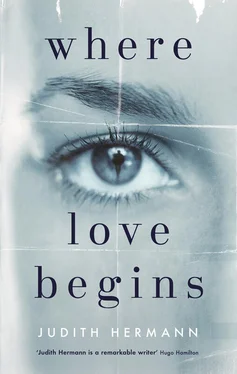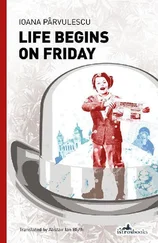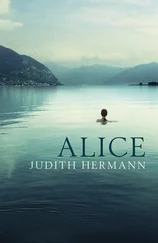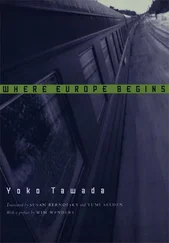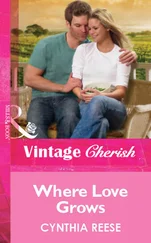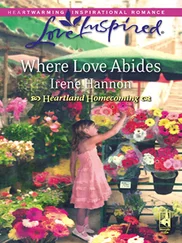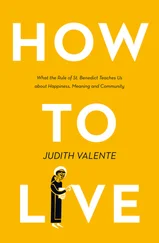You have no idea what hot is. In kindergarten today we’ll be allowed to go swimming. Are you going to buy strawberries? Can you buy ice cream? Can we turn on the lawn sprinkler soon? I love it when it’s hot. I love when it’s summer. Stevie loves it too when it’s summer.
Stella listens to Ava’s voice, Ava’s self-absorbed questions, she can hear satisfaction in Ava’s voice. Satisfaction in her clear observations, unambiguous feelings. I love summer. I love hot weather. Stevie loves summer too.
Do you love summer? Ava leans far to the left so as to be able to see Stella from the side; the bicycle wobbles. Ava puts her arms around Stella’s stomach from behind.
Yes, I love summer too. Sit up straight, or we’ll fall over. But I like winter better. I like it better when it’s cold and it snows and is stormy.
Why?
Oh well, why.
The lawn at the kindergarten is shady and cool. The round table has been set for a second breakfast under the trees. Stella greets the kindergarten teachers from afar; she’s afraid there might be questions about Ava, remarks that might alarm her. The shadows of the tree leaves dance over Ava’s face, she looks so wide awake, she gives Stella a firm, untroubled child’s kiss.
Tomorrow we’re going to Papa.
Yes, tomorrow we’re going to Papa.
*
Stella cycles home. She pushes the bicycle to the back of the house, unlocks the sunroom door with the key that’s kept under the watering can, thinking that she should take the key inside the house, but then she puts it back under the watering can. She leaves the door open. Washes the dishes in the kitchen, makes tea, turns the washing machine on and the radio off, and sits down with the newspaper at the kitchen table.
Mister Pfister rings the bell at nine twenty-three.
Stella, her head propped in her hands, looks closely at a photo of some Chinese mine workers. Black faces, iridescent eyes. She reads the caption without understanding a single word. She turns one page back, then forward again. After a while she gets up from the table and goes into the living room, casually, just a woman looking out of the window, nothing more. The street is deserted. Nobody standing outside the garden gate. Nothing moving.
Stella closes the sunroom door, takes her jacket from the coat rack in the hall, and leaves the house. She doesn’t look inside the mailbox. Pulling the garden gate shut behind her, she turns left and walks down the street.
*
A dog is lying in the sun outside the house next door. The front door is open; the student — Political science? Medicine? English literature? — who sometimes, either shyly or rudely, says hello over the fence, is nowhere to be seen. Her dainty vests and yellow dress hang on the rotary clothes dryer on the lawn; the grass hasn’t been cut; the flowerbeds are neglected; sunflowers are already shooting up in several flowerpots. The picture window is dusty; in its right-hand corner, a skeleton, its bony hand held up in warning; candles in bottles on the windowsill. Stella looks at the display; she has the distinct feeling that it all has a meaning, a hidden message.
The house of the Asian family next to it is freshly painted; the garden, well cared for, the hedge trimmed and almost impossible to see through, a silver car in the driveway, the blinds down at all the windows.
An old woman one house farther on is clipping the branches of a rhododendron with huge garden shears; she greets Stella indulgently, and Stella greets her in return as she goes by, then she passes an empty, undeveloped lot. Stella vaguely remembers a house burning, an accident. Fallow land, yarrow and lupines, dried-out soil, no birds, finches, wrens in the grass. Next, a house with a glittering pool on the lawn, another one with an awning extending over the picture window and the terrace in front, an ironwork table, four chairs set around it as if for an important meeting. And then a house with a man sitting out front on a folding chair, setting the spokes in a wheel; on the stairs leading up to the front door a portable radio is playing; a mirrored sphere hanging in the branches of a sumac between the two properties throws spectrally coloured points of light on the house and the lawn. The man raises a hand. Stella has seen him before — where was it, in the city, at the shopping centre, at the kindergarten? She saw him at the kindergarten, a bicycle mechanic; he was fixing the children’s bicycles. A boat lying under a tarpaulin, old bicycles leaning against each other in the rear part of the garden. Something makes Stella pause, and the man gives the wheel a push and sits up. Carlyle was in a spot, he’d been in a spot all summer, since early June, when his wife had left him, a voice on the portable radio is singing. Stella can hear each and every word clearly; she can see everything in detail, heightened and exaggerated; possibly it’s because her heart is beating rather fast that she feels as if she were afraid. But afraid isn’t the right word. She sees the wheel slowing down and coming to a stop, sees the man lean back in his chair; the chair is standing on sand, the garden path isn’t paved; the sand is dazzling, summery. The next house is Mister Pfister’s house. Number 8, and Stella looks away and walks on before she can change her mind. She can still hear the voice on the radio. A man softly and suggestively whistling to himself. Then she’s there.
*
Mister Pfister’s house is white. A grape vine grows skyward next to the front door. The grass is bleached. No flowerbeds, no garden chairs, no clay pots, no table, no umbrella. Nothing.
His house sits there, silent and still, in the midday sun. Orphaned. Stella has to squint, then sees that the picture window has been draped on the inside with some dark material, the small window next to the door also seems to be blocked with something, and the panes of glass in the door are black.
Grass grows in the cracks between the steps. For some intangible reason it’s as if the front door hadn’t been opened in a long time, as if Mister Pfister went in and out through the back door or through the chimney. Stella stands by the garden gate. She feels dizzy and hot. She has her hands around the rusty braces of the fence, looking at it all; there’s something gratifying about being able to look at it all. It’s like getting satisfaction, how do you say, it is like an appropriation. Stella feels that she oughtn’t to be doing this — she shouldn’t even be here. She is doing the opposite of what Jason advised her to do; she is reacting even though Mister Pfister doesn’t even know anything about her reaction. But she can’t help it. She cannot resist. She looks at his house the way he looks at hers; her eyes follow his route without holding back, without any affection. She also knows that the way he looks at her house, at her home, lacks all affection. Somehow or other, she knows it.
Mister Pfister’s mailbox is old and dirty. Stella turns around; there’s no one in sight. She lifts the cover. Feels the perspiration running down her spine. The mailbox is brimful. Advertisements, direct mail, window envelopes. Stella takes out a letter, an official letter from a bank, and stuffs it back into the mailbox. So, even if she were to write to Mister Pfister, her reply would never reach him. Mister Pfister, it seems, doesn’t read his mail; nor does he seem to want to receive any more, and Stella has a sudden inkling about the inside of his house: mountains of paper, piles of newspapers, garbage bags, the kitchen half dark, the table full of things, things that from Mister Pfister’s point of view might change their form any minute, their shape, their purpose and their identity. A bizarre, glowing, toxic wave of chaos sloshes from the house over the doorsill out into the garden, flowing towards Stella, and Stella lets the cover of the mailbox drop and backs away.
Читать дальше
